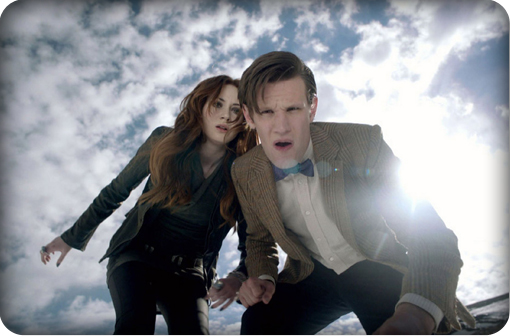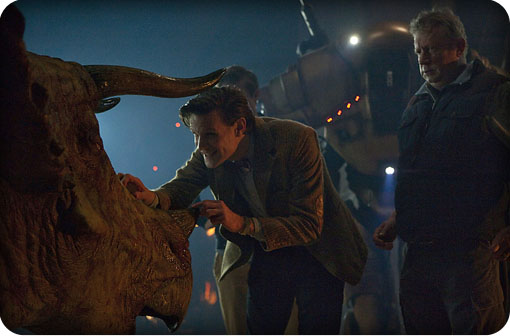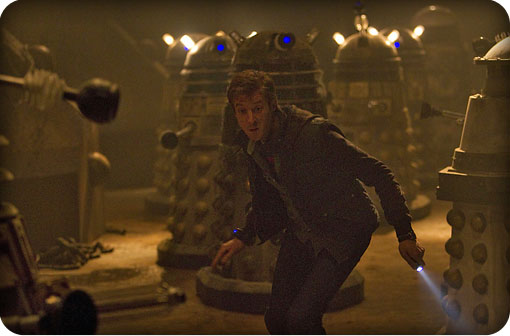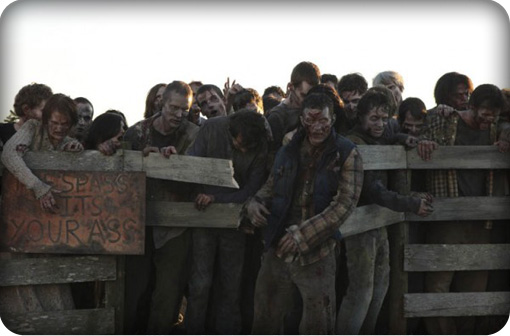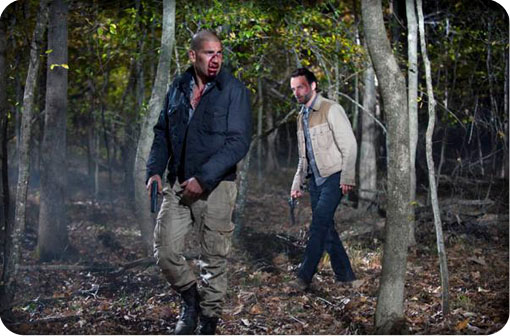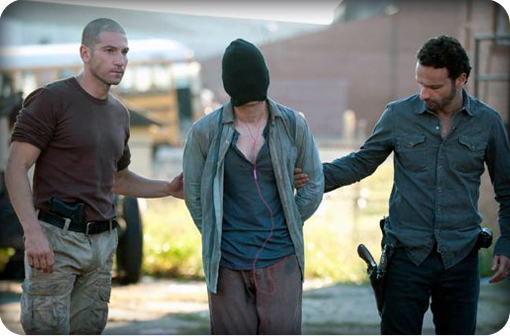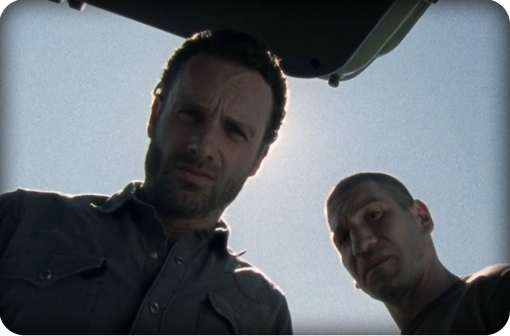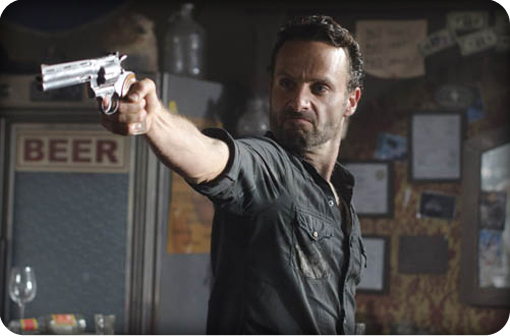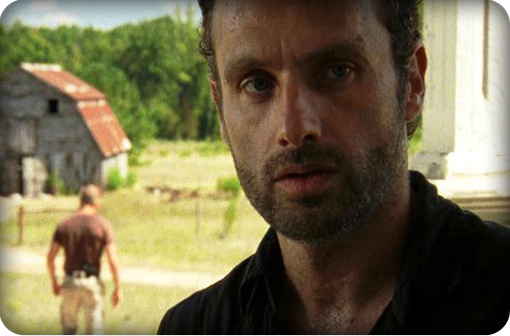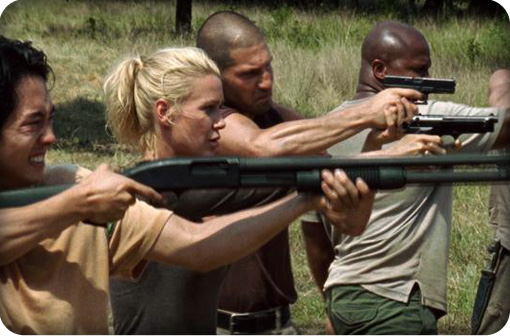
I must confess, I did The God Complex something of a disservice a year ago, awarding it a score of 8/10 after a single viewing; a second watch revealed the episode to be a stonewall classic and if I could have changed my score, I would have done. Now the author of that story is back, and this year I made sure and watched A Town Called Mercy twice before sitting down to write this. Much as with Whithouse’s previous episode, that second viewing helped dispel any misplaced expectations and allowed the episode to reveal its value free of the anticipation that it might be something it was never going to be.
As the mid-point in Doctor Who’s “Pond Farewell” mini-series, A Town Called Mercy is easily the best-looking episode we’ve seen in many a long while. Given Steven Moffat’s brief for larger-scale “movies” on a television budget, the trip to Spain (to shoot the episode in Clint Eastwood’s old spaghetti western sets) was worth every penny, and director Saul Metzstein has produced 45 minutes of TV that, just like his Dinosaurs on a Spaceship, wouldn’t look remotely out of place in a Cineplex. Murray Gold’s score is playful and sublime.
It’s the balance of the drama that sets this episode apart, however. The anticipation, after Daleks and dinosaurs, might have been for a cliché-busting cowboy story, dripping with wry humour and even wrier genre observation, but Whithouse’s story eschews many of these expectations and – for the larger part – does something entirely different. That first viewing was a very odd experience (and you can find out just how odd by listening to the latest Blue Box Podcast, recorded immediately after first seeing the episode).
Coming on like Universal Soldier meets Boom Town against a backdrop of A Fistful of Dollars, A Town Called Mercy is, tonally speaking, a strange kettle of fish indeed. Steven Moffat must have known, when he gave this commission to Toby Whithouse, that the author of School Reunion and creator of Being Human was unlikely to write anything as two-dimensional as the simple pitch “alien gunslinger in the Old West” might have suggested.
Toby Whithouse strikes me as the kind of writer who likes to play with convention (not to mention episode titles; after any number of combinations of Gunslinger and Mercy, in the end it’s a pity that The Two Doctors was already taken), and while his previous episodes have occasionally shown that his science fiction isn’t quite up to his character drama, for once, that doesn’t matter. There’s a point less than halfway into A Town Called Mercy when Whithouse turns the episode on its head and confounds everything you might have been led to expect from the story. And that’s when the real Toby Whithouse kicks in, and the genre conventions are largely sidelined in favour of something much closer to the author’s “comfort zone”.
The opening of the episode is something else, though. The pre-titles sequence is the most traditional we’ve seen this year, even down to the what-can-that-mean reference to “the Doctor”. It’s the scene that follows the titles that really sets the tone. No faffing around with the hows, whys and wherefores, Matt Smith has brought Amy and Rory to the Wild West, and the words Keep Out aren’t going to stop his investigating. The three characters’ arrival in Mercy is delightfully written and played. Having already been introduced to the Gunslinger, the mystery that they are trying to uncover is one that we the audience are already partly a party to – but after a brief (and very funny) jaunt through the conventions of the genre (Luke Skywalker’s best friend, as the Undertaker, is almost as amusing at Smith’s toothpick antics), we are introduced in short order to Kahler Jex, and while the bulk of the episode might not, from this point onwards, be difficult to predict, it’s the way it plays out that is ultimately so satisfactory. This is when Whithouse hits us with some Big Ideas (School Reunion showed that he’s no shrinking violet when it comes to including a Big Idea as nothing more than a sub-plot), and turns the episode into a character-led drama that nevertheless never shies away from the conventions of the genre that he’s been chosen to write.
It’s a very awkward, but somehow quite affecting, cocktail of Man With No Name cliché and authentic-feeling and very human interaction. You wouldn’t expect the grey-shaded story of the past and future Kahler Jex to sit quite so comfortably with that of the cyborg gunslinger stalking the township, but nevertheless a neat balancing act is achieved. It’s an odd experience, is A Town Called Mercy, but a rewarding one. The Doctor’s dilemma is expertly drawn, and although Smith’s initial reaction is difficult to accept (even after Solomon’s fate a week ago), at least it gives Amy something useful to do (sadly the one downside of this episode is that she and Rory are rather sidelined). But where the two companions suffer, the guest characters come into their own.
Ben Browder as Isaac pitches his laconic but idealistic performance with just the right lack of pretension, and along with Byrd Wilkins as the preacher gives the townsfolk just the authenticity that the Kahler Jex story needs to maintain its verisimilitude. Adrian Scarborough, as the alien doctor himself, is revelatory. It’s an almost impossible role, an alien wizard who is likeable and heroic, yet also a war criminal and mass-murderer in disguise. That Scarborough, the man we all remember as the hen-pecked husband giving never quite as good as he gets in Gavin & Stacey, can convince in both of Jex’s guises and even more so make the character’s final act seem believable, is astonishing. The act hits just the right shade of grey for the resolution never to seem obvious. Andrew Brooke makes for an imposingly “human” cyborg.
But the real meat of the story is the Doctor’s, and the philosophy and psychology of death and killing. There’s a beautiful moment when a young and potential new gunslinger asks of Jex, “Is he really worth the risk?” and Matt Smith’s reply, “Don’t know. But you are,” is simple and effective enough to take your breath away. There’s a lot of clowning around from Smith in this episode (not least of which with Susan the horse), but he proves here as he does time and again elsewhere that when it comes to the serious stuff, he can nail that too. Whithouse also brings up the subject of religion quite effectively, counterbalancing the superstitions of Jex with those of the residents of Mercy, and not undermining either. “You don’t get to decide when and how your debt is paid,” Jex tells the Doctor at one point, but when Jex finally decides that he can, it seems appropriate and the only way for the story to end.
The tonal shifts during the latter half of the episode are occasionally rather unsettling, and the episode as a whole has a schizophrenic nature that is difficult to come to terms with, in spite of the fluidity of Whithouse’s writing and Metzstein’s direction. It’s beautiful and thought provoking and silly in the way that only Doctor Who knows how to be, but I genuinely find it hard to know what I think of it. A Town Called Mercy sits uneasily between Chris Chibnall’s two rather more straightforward episodes, and although I doubt it’s going to be anybody’s favourite of the series, I suspect that it will leave as many viewers having enjoyed it as much as I did, while as unsure of its value as I am. The brilliant thing about Doctor Who is that it dares to be different, and that it dares to throw the occasional googly, and in spite of Steven Moffat’s promise that this run of five stories would be big and easy on the eye, Toby Whithouse’s story is certainly not as easy on the mind.
It’s an achievement that is not to be unapplauded.


